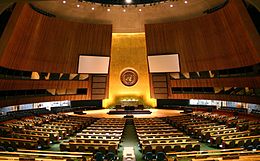It is all too easy — for translators, or for anybody for that matter — to make fun of bad translations and poor command of English. But, for translators at least, we can always justify our mockery with the reasoning that we’re raising awareness about the importance of language skills and the need to rely on professional translators. So here’s the best and longest example I know of pure nonsense.
I heard this story of a U.N. delegate’s speech in English gone terribly awry from Laurie Treuhaft, a longtime French and Spanish translator at the U.N., at a meeting of the New York Circle of Translators. I was afraid it was too good to be true, especially after an Internet search revealed a YouTube video that purported to show the speech in question, but turned out to contain a 15-minute speech about economic development in Africa, in which the speaker did not stray from his written remarks. So I checked with Laurie, who assured me that she heard an audio recording of the speech which a friend who was a U.N. interpreter played for her in the mid-1980s. The text can also be found in an obituary of the ambassador online.
At the 1981 U.N. General Assembly, the delegate from Pakistan, Nawab Jam Amir Ali Khan, decided, against the advice of his staff, to add a few words of his own at the end of his prepared speech. He launched into the following flights of linguistic fancy, which struck the U.N.’s simultaneous interpreters dumb, as there was no way to turn such stuff into another language.
Now sir, in conclusion, I humbly submit that the dilemma for the resolution of the conscious outlook is the only remedy. It is said that abhorrence for the learned in his infidelities and the inept in his devotions – our times are impatient of both and especially of the last. Let us not be pestered with assertions and half-truths, with emotions and scuffle. In the closing decades of the 20th century, these cannot conceivably solve any problem and indeed it is the source of positive danger to mankind – or words to that effect. It declares that this community of interest, in interests makes all men, otherwise differently interested partners in the great enterprise of replacing evil with good and good with better, so as to achieve the best possible. It is a proverb that to cut the cakes is never conducive to mankind. Also it is not humanitarian to be with farrago of twisted facts. God save us from the sprangles of cataclysm. And the scuttles of the ship should be repaired expeditiously by this august body. It is said that one man’s mickle is another man’s muckle. In conclusion, I greatly appreciate and express my warm gratitude to you by giving me the floor of this august house. Thank you.
I honestly have no idea what he is trying to say, but it all sounds very earnest and lofty, with a touch of Lewis Carroll. There’s no such proverb as “One man’s mickle is another man’s muckle,” but I think there should be.
Image: U.N. General Assembly Hall, via Wikimedia Commons

